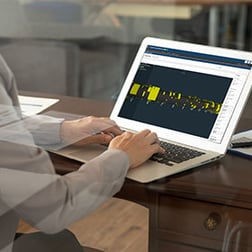One Bridge Solutions
Polaris – Closing the loop with a modern SaaS solution for Integrity Management
Following our procurement of Phillip’s 66 on-premise solution, we’ve been busy migrating it to the Microsoft Cloud in preparation for our Private Preview program. Through our Private Preview program, we plan to launch a minimally viable product (MVP) into the market worldwide in Q4 of this calendar year. Typically, we would be conducting several whiteboard sessions with customer journeys; however, through demos we have done with prospective customers thus far, we are certain that the solution already has the appropriate business processes in place. Prospective customers have confirmed both the technical and business workflows are very modern and align with current industry best practices. This is further supported by the fact that Phillips 66 has been using the existing solution for the last eight years to manage their integrity department across their entire enterprise in a production environment. Therefore, we have modified our private preview program as an exercise to identify gaps and modify terminology to ensure Polaris will be a commercially viable product that would seamlessly integrate with pipeline operators’ integrity management processes today.
Features & functions deployed as part of MVP
From analyzing numerous reports and product offerings currently present within the marketplace we have identified the following business process areas as ones that are imperative and appear to provide the most business value. Below is a description of each module we currently plan to include as a part of our MVP (minimally viable product):
| Assessment Planning:
|
| Integrity Compliance:
|
| Threat Monitoring:
|
The overall objective of the initial release is to allow operators manage the end-to-end lifecycle of their integrity management work as an enterprise-grade solution that can easily be scaled up or down based on business requirements and budgets. As a testament to the effectiveness of Cognitive Integrity Management™ so far, Phillips 66 will be moving to Polaris upon its release.
Polaris can help support daily processes:
Polaris creates significant business value, especially for operators running legacy on-premise applications and/or manual processes built on Microsoft Excel spreadsheets to truly ignite your digital transformation. Here are some of the top reasons we believe this to be the case.
Legacy on-premise applications (5-10+ years in operation)
Cases are now popping up in the oil & gas industry where pipeline operators are getting out of the IT business entirely, Chevron sells their datacenter to Microsoft, and re-focusing on their core competencies, a perfect instance of proof that Digital Transformation taking place in the industry and its gaining momentum.
Why are we seeing this shift? It’s expensive to build and maintain software. To determine true ROI, operators need to account for everything that goes into development, including the hardware, electricity, and resources; accounting for both employees who keep the hardware from crashing, but also those responsible for writing code, often done by senior developers. And, the work is never done. It manifests as an ongoing CAPEX to the organization. With the current price of oil, senior management is rapidly trying to get out of building everything in-house and refocusing on the core competencies of the organization.
Polaris Business Value
- Polaris is a cloud solution so no software install or IT is required and it’s always current and up to date with new features/functions available as soon as they are made public. Also, pipeline operators as a community are helping to drive the ongoing product roadmap through an open anonymous feedback loop.
- The pricing model is truly disruptive to current industry practices allowing the organization to budget and operates on an OPEX basis, at typically 1/8 of the cost to carry out similar processes. This allows integrity engineers to apply their expertise to more high-value engineering tasks.
Manual or Excel-based processes
Numerous operators have invested resources, time, and money on trying to manage their IMP in Excel. Unfortunately, Excel is not a system…it’s a tool. There are countless reasons Excel shouldn’t be used as a foundation to build a mission-critical enterprise software solution. It has no audit control, data is unstructured (given the volume and criticality of integrity data, this is reason enough), and it’s extremely difficult to report and share results from data across the entire enterprise. We suspect the core reason Excel has been used as much as it has is because of cost, its familiarity, and limited options available in the market at the time.
Polaris Business Value
- Data science and Machine Learning require lots of data. As more operators sign up, our algorithms will evolve as will requests for new algorithms. We will be able to solve existing problems and identify new ones from all the additional data. As we solve them, that knowledge will be shared across all pipeline operators who are using the solution, while keeping their data safe and secure in their own tenant.
- It’s an enterprise-grade solution. This means it has the capacity to store databases, normalize and validate data with logic specific to common business rules, create a workflow around structured processes all on modern technology. Providing tools that are cutting-edge helps to recruit and retain younger employees while minimizing the effort to onboard these employees. In a nutshell, it’s the opposite of Excel.
Polaris solves many of the issues associated with traditional on-premise and/or manual processes, but the fundamental value is in the business intelligence and reporting it provides to the organization.
Give us an hour of your time and we can show how you can leapfrog your integrity management department into the cloud, a world that enables substantial cost savings to your existing processes.


















